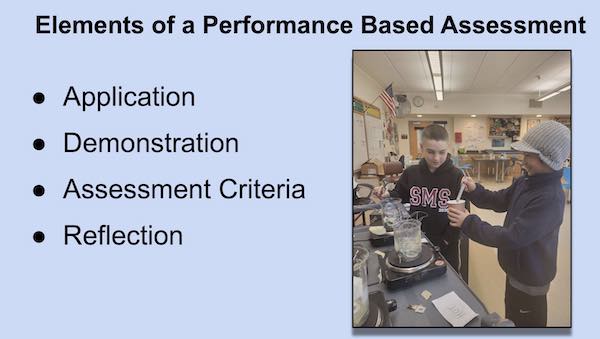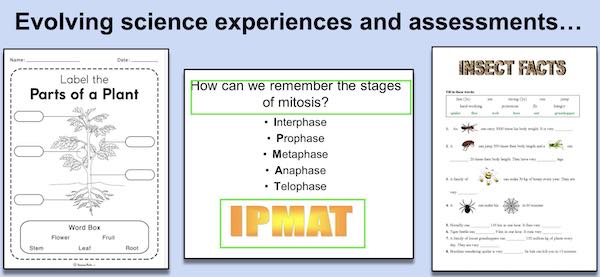Performance Based Assessments Allow Students to Learn While Demonstrating Proficiency
- Thursday, 04 April 2024 08:43
- Last Updated: Thursday, 04 April 2024 08:57
- Published: Thursday, 04 April 2024 08:43
- Wendy MacMillan
- Hits: 1916
 When we think back to our days in high school, I’m sure we can all remember cramming the night before a big exam surrounded by flashcards and hi-lighters…but how much of the crammed information do you actually remember? And did the multiple choice tests you took feel meaningful or applicable to the real world? In his Education Report at the BOE meeting on Monday, March 25th, Assistant Superintendent Edgar McIntosh outlined the district’s work to create more opportunities for Performance Based Assessments which offer students a more purposeful and material way to test one’s knowledge. Since many missed the late night report, we reached out to Dr. McIntosh who shared a summary of his presentation notes describing the importance of Performance Based Assessments and how they are used in classrooms.
When we think back to our days in high school, I’m sure we can all remember cramming the night before a big exam surrounded by flashcards and hi-lighters…but how much of the crammed information do you actually remember? And did the multiple choice tests you took feel meaningful or applicable to the real world? In his Education Report at the BOE meeting on Monday, March 25th, Assistant Superintendent Edgar McIntosh outlined the district’s work to create more opportunities for Performance Based Assessments which offer students a more purposeful and material way to test one’s knowledge. Since many missed the late night report, we reached out to Dr. McIntosh who shared a summary of his presentation notes describing the importance of Performance Based Assessments and how they are used in classrooms.
Here is the presentation (Slides 12 - 32) and what he said:
“Performance Based Assessments (PBAs) are important tools used to evaluate the essential skills and dispositions that are difficult to measure in a standard testing format.
Performance-based assessments require students to demonstrate the ability to appropriately apply their skills and knowledge, demonstrate or model their proficiency, and work from clear and transparent assessment criteria, with opportunities for students to reflect on their performance and learn from it.
This type of assessment demonstrates a depth of understanding of what is learned and the developing skills of the learner. One of the most celebrated parts of PBAs is that learning can occur during the actual assessment.
Since Scarsdale has been working on the development, design, and pilot of PBAs for several years many of them are already integrated into the assessments practice across disciplines and levels, some core to certain courses, and some of them represent a movement from past assessments. NY State has also begun expanding its science tests to include PBA elements in their yearly assessments.”
(During the presentation, he highlighted PBAs in writing and weather science at the elementary level, engineering and public communication at the middle level, and design and world languages at the high school)
McIntosh explained: “As we think about this important assessment work, we think it’s important that we are always checking back and measuring what is important---that we are checking for depth over the speed of coverage- and flexible understanding over rote memory.
The Next Generation Standards do a good job of articulating this, and the value of developing the knowledge, skills, and practices that will lead our students to becoming critical thinkers.
For example, when considering students' mathematical understanding, we know that developing fluency and conceptual understanding is more important than rote memorization and overreliance on an algorithm.
This was illustrated beautifully in a fifth-grade classroom recently when students were practicing the division by fractions. Some students were familiar with the trick “Keep, Change, Flip”-meaning, keep the number, change division to multiplication, and flip the numerator with the denominator. By doing this, the class easily divided 6 divided by ⅓ and came up with 18. The question then becomes, why does it work? Some predicted that dividing by a fraction would result in a smaller number. At this point, the teacher invited students to model why the answer 18 was correct. She provided number lines, strips of paper, and time for them to describe, disagree, and demonstrate why 18 was correct and why the trick worked. Interestingly, it wasn't the speediest of mathematicians who came up with the clearest model.
And like PBAs, so much is about asking the right questions, and allowing the space, resources, and time for students to demonstrate and defend their thinking and learning.
This leads me to another important point. We must be using the pedagogy, resources, and tools that will get us to the outcomes we want for students.
For example, we have specifically chosen science materials and progressions from Smithsonian and Science 21 because they are aligned with the practices reflected in the Next Generation Science Standards and include experiential opportunities for students.

Also, we chose Reveal Math because it was one of the products that prioritized the important mathematical practices in Next Generation Standards in Math.
For those who have seen past educational reports dedicated to curricular changes, the rationale for this change was outlined, including a description of a rigorous and collaborative process to choose this research-based math resource.
We celebrate the increase reported in student discourse in math while recognizing that every change requires teachers, administrators, and coordinators to develop together and continue to use professional opportunities and structures, like program improvement days to adapt curriculum responsively and professional workshops to refine our instructional practices.
I look forward to sharing meaningful metrics, reflecting the values we’ve described in an upcoming education report.
Teaching to the test is not a bad thing if the knowledge, skills, dispositions, and practices we value are embedded in the daily learning opportunities and the assessment. In other words, high-quality pedagogy and curriculum are our best test prep for high-quality assessments.
I would be remiss if I didn’t point out that our colleagues- the educators in the arts, physical education, performance, and music have been engaging in performance assessments all along. Application, demonstration, criteria for success, and reflection.
And that we have courses that center creation, demonstration, and research, rely on PBAs- and nurture the dispositions and skills our students will thrive with. A rich collection developed over time, with a robust representation of STEM courses.
-Digital Logic
-Electrical Engineering
-Computer Science 922 (Application Based)
-AT Linear Algebra
-Science Research
-Entrepreneurship
-Public Speaking
-Design Build
-Robotics
-Expressive Communication
Beyond these courses, we look to continue to expand PBAs across the grades and disciplines. We know they measure critical thinking, problem-solving, and power skills, and encourage iterative, and active learning. They are particularly useful in subjects where practical skills, collaboration, and creativity are paramount.
A quick look at the profile of the graduate- and you’ll see many of the outcomes we desire for our students are brought about by instruction and curriculum that value it--and assessments that measure it."
See here for the Education Report.






